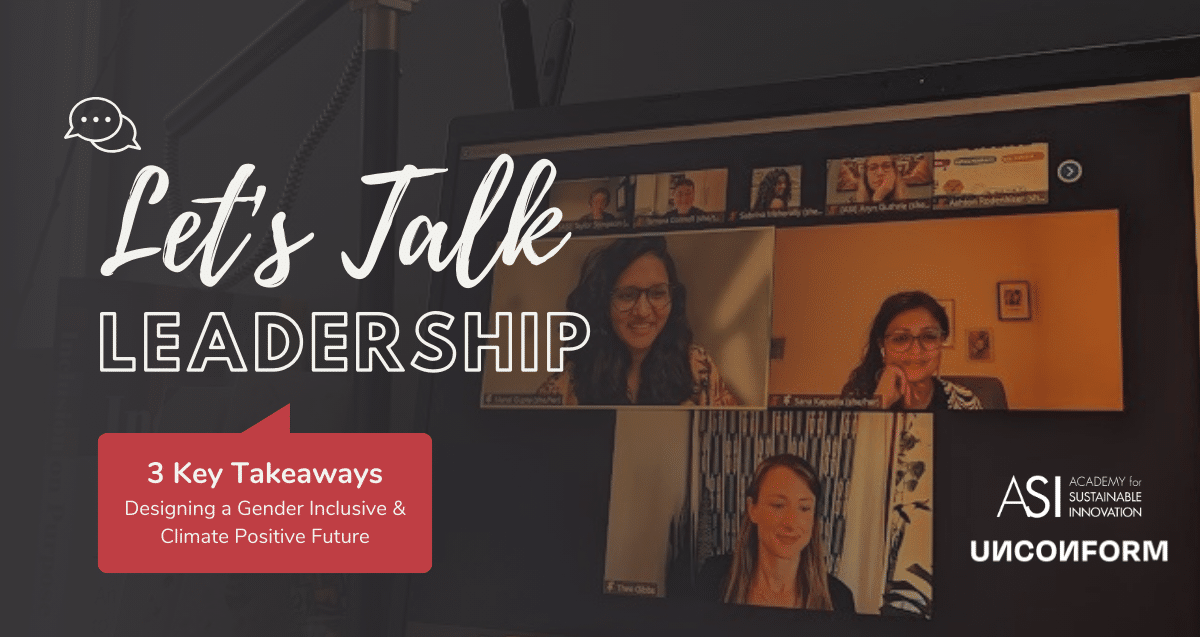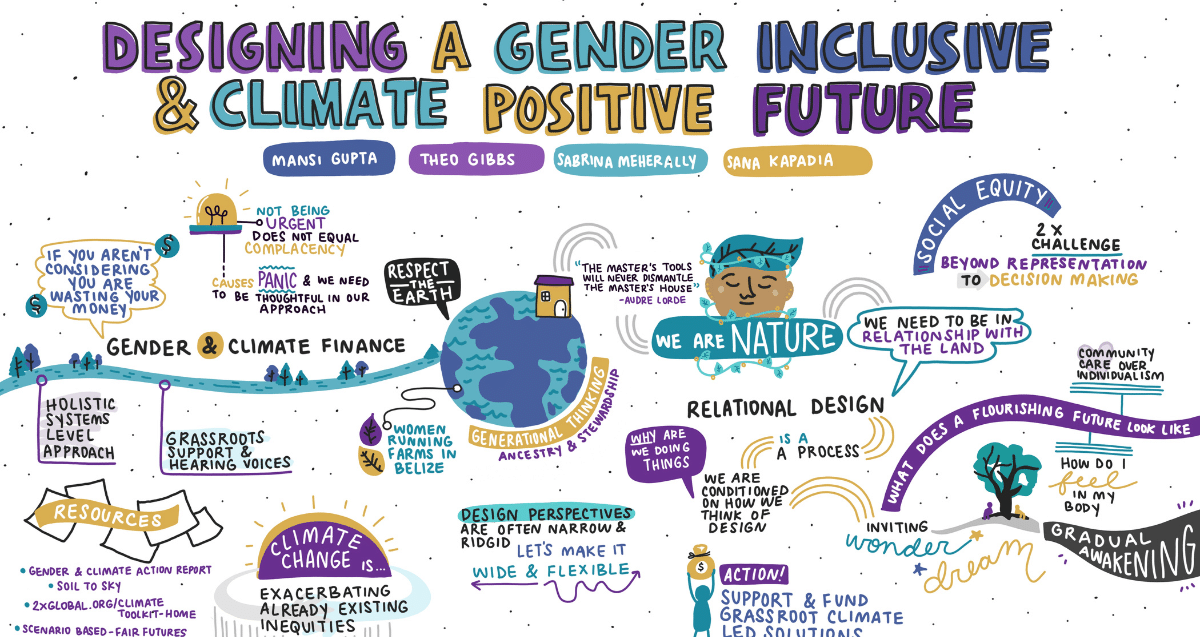Audio Graphic Recording
by Let’s Talk Leadership: Designing a Gender-Inclusive & Climate-Positive Future
The Academy for Sustainable Innovation and Unconform had the pleasure of teaming up last month to chat about the confluence of design, gender, and climate. Our intention was to emphasize that the climate crisis is far from being gender-neutral, and that solely focusing on climate change without recognizing its connection to gender runs the risk of exacerbating the social inequalities faced by women, girls, trans- and non-binary people.
Throughout our conversation, we were inspired by the active participation and valuable insights shared by speakers and attendees on designing climate change initiatives, products, and programs with a gender-inclusive approach.
The Let’s Talk Leadership events are not recorded to encourage open and honest conversations. In lieu of a recording, we had Ashton Rodenhiser of Minds Eye Creative, a graphic recorder, put together an illustration capturing some of our collective thoughts.
So, how can applying a gender lens to our climate action work accelerate progress in mitigating and adapting to climate change? We’ve compiled our key takeaways from the event below:

Gender-Smart Investing for Robust and Resilient Systems
During our discussion, Sana Kapadia emphasized the importance of gender-smart investing in building stronger and more resilient systems. By incorporating a gender lens, we can uncover unique opportunities and potential challenges that a narrow perspective might easily miss. This, in turn, leads to a more thorough evaluation of risks, making investments less vulnerable to unexpected shocks. Moreover, companies that prioritize gender and diversity often exhibit enhanced governance which can bring long-term stability, new perspectives, and effective risk management to the organization. By going beyond focusing solely on gender representation, companies can actively incorporate gender diverse voices into the strategic decision-making process. As a result, businesses become better equipped to navigate challenges, leverage opportunities, and stay ahead of the curve.
Unstacking Lenses: Reimagining Climate Justice
The interconnectedness of climate change and social justice is complex and multifaceted and can be overwhelming to consider from all perspectives. Instead of stacking lenses into our design, Theo Gibbs suggested that we take a step back and reimagine design perspectives that are often narrow and rigid, and make them wider at the margins. This idea highlights the importance of considering the experiences and viewpoints of individuals and communities who are often overlooked or excluded from mainstream discourse. It recognizes that those at the margins of society may possess a more holistic perspective because they have had to navigate and adapt to the challenges and inequalities that the center may not fully comprehend.
Unearthing Creativity and Challenging Colonialism
Bringing wonder and creativity into the design process is a powerful way to question and reshape practices rooted in colonialism. To effectively dismantle systems and design for meaningful climate action, we must start by questioning why we do what we do and challenge the underlying assumptions and biases that have been ingrained in our practices over time. Sabrina Meherally encouraged us to invest in actions and initiatives that may not yield immediate results but will have a profound and positive impact over time. She provided a wonderful example of a generation planting trees, not for their immediate benefit, but for the next generation to enjoy their shade. Sabrina’s message reminds us that we need to be more thoughtful and intentional in order to create a holistic approach.
We want to express our gratitude to the speakers for sharing their valuable insights. Their contributions have emphasized the importance of prioritizing gender considerations in design, which, in turn, ensures that climate solutions are relevant, impactful, and inclusive. Special thanks to Mansi Gupta for bringing us all together!
Below, you’ll find a compilation of the resources that were shared during the event.
Resources
- Gender and Climate Action, report by Silvia Lesi for the European Investment Bank
- Soil to Sky: Climate Solutions That Transform, from CLIMA Fund
- 2X Global Toolkit: For those looking to get started on their climate and gender finance journey.
- 2X Global Scenario-Based Work – Fair Futures
- 2X Global Case Studies Case Studies
- Climate x SRHR Framework
- Book: “Hospicing Modernity: Facing Humanity’s Wrongs and the Implications for Social Activism,” by Vanessa Andreotti
- Examples of Multiple Futures: Escobar, A. (2011). Sustainability: Design for the pluriverse. Development, 54, 137-140.
- Speculative Futures in Gender and Equality, by IDEO.org
About the Speakers

Sana Kapadia (she/her)
Director of Strategy, 2X Global
Sana Kapadia’s career has spanned impact investing, gender finance and social entrepreneurship, equity research, advisory and development finance. She has been focused on supporting the mobilization of capital and tailoring equitable solutions that serve the needs of communities, supporting systemic shifts, and facilitating the deployment of more gender-smart and impact-aligned capital. Specific areas of interest for her include gender and climate finance, enhancing intersectional analysis in finance and unlocking gender-smart capital at scale.

Theo Gibbs (she/her)
Senior Climate Strategy Advisor, YLabs
Theo Gibbs works at the intersection of human wellbeing and planetary health, bringing over 10 years of experience in the design, systems innovation, and technology fields. In her current role as Senior Climate Advisor at YLabs, she provides strategic guidance to YLabs’ global portfolio of programs and technologies. Most recently, she co-authored the Climate-Sexual Reproductive Health Framework, a resource that examines the impacts of climate change on sexual and reproductive health outcomes and provides pathways for synergistic investments. Joining YLabs in 2017, she led the vision and creation of YLabs’ climate-health-gender portfolio, supporting the organization to integrate an understanding of the extraordinary risks climate change poses to young people’s health and economic futures.
Previous to YLabs, she served as a systems innovation strategist at Stanford ChangeLabs, working with philanthropic and private sector clients including Google, WWF, Ericksson, and the Gates Foundation. She is also a Fulbright Scholar and an Aspen Ideas Scholar. She holds an M.S. and B.A. from Stanford University.

Sabrina Meherally (she/her)
CEO and Relational Design Strategist, Pause and Effect
Sabrina is a creative disruptor and liberatory futurist, fueled by imagination, experimentation and wonder. She founded Pause and Effect to change and decolonize the institution of design, by cultivating responsibility for our impact on people, land, and systems, and relying on technologies of relationality and care. She views change as an inevitable process, that can be shaped through ritual, collective action, and thoughtful decision-making. The name, Pause and Effect, stems from an understanding that to go far, we must slow down. Sabrina is the descendant of ancestors, who moved through repeated cycles of loss and survival – and brings their lessons of kinship and emergence into her vision for flourishing futures. Living on stolen Musqueam, Squamish and Tsleil-Waututh land, as the daughter of refugee and immigrant parents, she uses her work and her voice to engage in reparative practices with local and global Indigenous communities.

Mansi Gupta (she/her)
Founder, Unconform (Moderator)
As the founder of Unconform, Mansi partners with organizations to help them incorporate a women-centric design lens across products, programs and processes. She is the creator of Women-Centric Design – a methodology focused on intentionally and actively designing for women; the author of Unconforming, a newsletter advancing dialogue at the intersection of women and design; and the curator of Design for Women Conversations, a monthly event series bringing together gender and design practitioners.Mansi has 10+ years of experience applying behavioural research & design strategy in social impact. Previously, she led projects at Women’s World Banking to increase financial inclusion among lower-income women in developing nations. Prior to that, she designed games to research reproductive healthcare in rural India as a designer for Final Mile Consulting.
Mansi holds a BA in Computer Science & Economics from Bryn Mawr College, and an MFA in Products of Design from the School of Visual Arts. She grew up in India, and is now based in Amsterdam.


